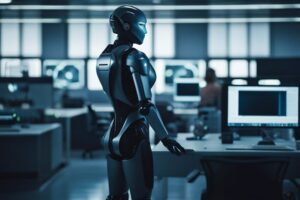Over the past few decades, advancements in artificial intelligence (AI) and robotics have transformed various industries, paving the way for increased efficiency and productivity. As we look to the future, it is evident that these technologies will continue to play a significant role in shaping the job market. This blog post explores into the impact of AI and robotics on the future of work, exploring the potential changes, challenges, and opportunities that lie ahead.
Impact of AI and Robotics on Employment
Job Displacement Concerns
The integration of AI and robotics in industries has raised concerns about job displacement. Many fear that automation will lead to a significant number of jobs being replaced by machines, resulting in a decrease in employment opportunities for humans. This shift in workforce dynamics has sparked debates on how to mitigate the potential impact on job markets and the economy.
Job Creation Opportunities
To counterbalance job displacement concerns, the adoption of AI and robotics also presents new job creation opportunities. While certain roles may become obsolete, the implementation of automation technologies also opens up avenues for specialized technical positions related to the maintenance, programming, and supervision of these systems. Additionally, the need for roles that require critical thinking, creativity, and emotional intelligence, which are currently not easily replicable by machines, is expected to increase.
Displacement
Despite the legitimate concerns about potential job displacement due to AI and robotics, it is necessary to recognize that new opportunities and roles will also emerge. As technology advances, there will be a growing demand for individuals with the skills to work alongside these technologies, ensuring that there remains a place for human workers in the evolving job market.
AI, Robotics, and Industry Transformation
Sectors Most Affected by Technological Advances
The advancement of artificial intelligence and robotics is revolutionizing various sectors of the economy. The manufacturing industry, for example, is experiencing a significant transformation through the integration of automation and smart technologies. This has led to increased efficiency, reduced operational costs, and improved product quality.
The Rise of New Job Categories
The introduction of AI and robotics is not only reshaping industries but also creating new job opportunities in emerging sectors. With the rise of automation, there is a growing demand for skilled professionals in fields such as data science, machine learning, and robotics engineering. These jobs require a unique blend of technical expertise and problem-solving skills.
To adapt to these changes and remain competitive in the job market, individuals will need to acquire relevant skills and knowledge in emerging technologies. Upskilling and reskilling programs will be imperative for professionals looking to capitalize on the opportunities presented by AI and robotics.
Preparing the Workforce for Tomorrow
The Role of Education and Training
Role Not only will the advancement of AI and robotics technology change the future job market, but it will also transform the skills and knowledge required by employees. Education and training will play a crucial role in preparing the workforce for tomorrow. It is important for educational institutions to adapt their curriculum to include subjects such as artificial intelligence, machine learning, and robotics. Additionally, ongoing training programs will be necessary to upskill existing workers and reskill those whose jobs may become automated.
Policy Interventions and the Labor Market
Policy Not only does the workforce need to be equipped with the right skills, but policymakers also play a key role in shaping the future job market. By implementing strategic policy interventions, such as incentivizing companies to invest in workforce training programs or creating regulations to ensure a smooth transition for displaced workers, governments can help mitigate the potential negative impacts of AI and robotics on employment.
Workforce As AI and robotics continue to develop and integrate into various industries, it is crucial for governments, educational institutions, and businesses to work together to ensure that the workforce is adequately prepared for the jobs of the future. By investing in education and training and implementing effective policy interventions, we can proactively address the challenges and opportunities brought about by the rise of AI and robotics in the workplace.
Ethical and Social Considerations
The Debate Over AI and Automation Ethics
With the rapid advancements in AI and robotics, there has been a growing debate over the ethical implications of automation in the workforce. Concerns are raised about job displacement, data privacy, algorithmic biases, and the potential loss of human touch in various industries.
Ensuring an Inclusive Transition
Any discussion on the future of work must address the need for an inclusive transition to a more automated world. It is imperative to ensure that the benefits of AI and robotics are distributed equitably, providing opportunities for upskilling and reskilling the workforce to adapt to the changing landscape.
A thoughtful approach to workforce development, education, and training programs is crucial to bridge the skills gap and empower individuals to thrive in a technologically advanced environment. Collaboration between governments, businesses, and educational institutions is imperative to create a sustainable and inclusive future for all.
Final Words
Summing up, the impact of AI and robotics on the future job market is undeniable. As technology continues to advance at a rapid pace, we can expect to see significant changes in the way work is done across various industries. While some jobs may become obsolete, new opportunities will also emerge, leading to a shift in the skills and roles required in the workforce. It is crucial for individuals and organizations to adapt and embrace these changes to stay relevant in the evolving job market. By understanding the potential of AI and robotics and preparing for the future demands, we can navigate this transformational period with resilience and innovation.



